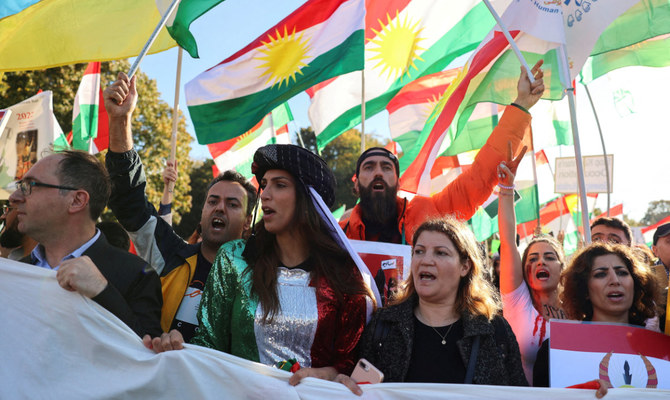BERLIN: Tens of thousands of people marched in Berlin on Saturday in a show of support for protesters in Iran where unrest ignited by Mahsa Amini’s death in police custody entered a sixth week despite a deadly state crackdown.
The protests have posed one of the boldest challenges to Iran’s clerical leadership since the 1979 revolution, even if they do not appear close to toppling a government that has deployed its powerful security apparatus to quell the unrest.
Amini, a 22-year-old Iranian Kurd, died in the custody of morality police after being detained for “improper attire.”
Protests erupted at her funeral on Sept. 17 in the Kurdish town of Saqez before spreading across Iran. Rights groups say more than 200 people have been killed in the crackdown.
Women have played a prominent part, waving and burning veils. The deaths of several teenaged girls reportedly killed during protests have fueled more anger.
In Berlin, police estimated 80,000 people joined the march, with protesters waving Iranian flags and holding banners saying “Women, Life, Freedom.”
Organizers said Iranians had traveled from the United States, Canada and all over the EU.
“From Zahedan to Tehran, I sacrifice my life for Iran,” human rights activist Fariba Balouch said after giving a speech at the Berlin gathering, referring to Iranian cities swept up in the protests.
The crowd responded with “Death to Khamenei,” referring to Supreme Leader Ali Khamenei.
Anti-government activists said the Berlin march was the largest ever demonstration against the Tehran regime by Iranians abroad.
“I feel very good, because we are here to (say) ‘We are with you, with all Iranian people’. I am Mahsa Amini’s voice,” said a protester who gave her name as Maru.
Videos posted on social media — which Reuters could not independently verify — showed protests continuing in Iran at several cities including Tehran, northeastern Mashhad, northwestern Mahabad and a number of universities across the country.
One video showed protesters lighting fires in the streets of Tehran’s Lalehzar district. Another showed cars in Mashhad honking their horns and demonstrators chanting “death to the dictator.”
Khamenei has warned nobody should dare think they can uproot the Islamic Republic, accusing its adversaries of fomenting the unrest. State TV has reported the deaths of at least 26 members of the security forces.
Some of the deadliest unrest has been in areas home to ethnic minorities with long-standing grievances against the state.
These include the Sistan-Baluchestan province in the southeast and its provincial capital Zahedan.
Iran’s Revolutionary Guards on Saturday accused a leading Sunni cleric of agitating against the Islamic Republic and warned it may cost him dearly after he held officials including Khamenei responsible for dozens killed in Zahedan last month.
Amnesty International has said security forces killed at least 66 people in a crackdown after Friday prayers in Zahedan, on Sept. 30.
Molavi Abdolhamid, Zahedan’s leading Sunni cleric, said during his Friday sermon that officials including Khamenei, head of the state, were “responsible before God” for the Sept. 30 killings.
He described the killing as a massacre, saying bullets had been fired at heads and chests.
A short statement on Sepah News, the Revolutionary Guards’ official news site, said: “Mr. Abdolhamid, encouraging and agitating youths against the Islamic Republic of Iran may cost you dearly! This is the last warning!”
State media said at the time of the Sept. 30 violence that “unidentified armed individuals” opened fire on a police station, prompting security forces to return fire.
The Revolutionary Guards said five members of its forces and the volunteer Basij militia were killed during the Sept. 30 violence.
Authorities blamed a Baluchi militant group. Neither that group nor any other faction claimed a role.
Protests had been fueled by allegations of the rape of a local teenaged girl by a police officer.
Officials have said the case was being investigated.
After protests erupted in Zahedan again on Friday, deputy interior minister for security, Majid Mir Ahmadi, said calm had returned, official news agency IRNA reported.
He said 150 “thugs attacked public property and even those shops belonging to Sunnis.”
Rights groups say the government has long discriminated against ethnic minorities including the Kurds.
The state denies accusations of discrimination.
In Iran’s Kurdish region on Saturday, videos posted online showed shopkeepers on strike in several cities in the northwestern Kurdish region, including Sanandaj, Saqez and Bukan.
















